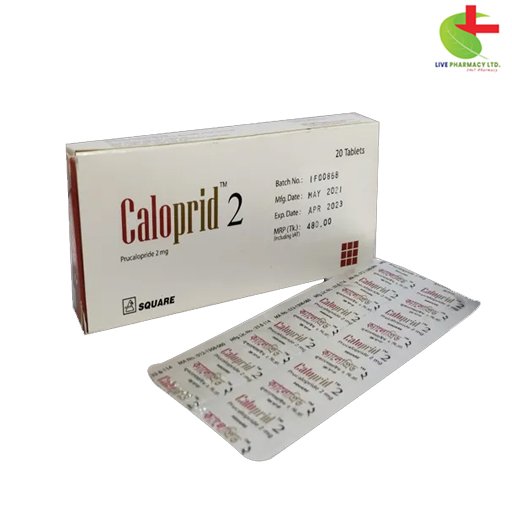Caloprid 2
240.00৳ Strip
- Caloprid provides effective relief for chronic constipation in adults, surpassing standard laxatives.
- Its unique pharmacology selectively stimulates 5-HT4 receptors, enhancing gastrointestinal motility without cardiovascular risks.
- With a recommended daily dose of 2 mg, Caloprid is well-tolerated and alleviates symptoms like abdominal discomfort and nausea.
- Trust Caloprid for gentle yet efficient constipation management, ensuring your well-being.
 Brand
Brand
|
Square Pharmaceuticals PLC |
|---|---|
 Generics
Generics
|
Prucalopride Succinate |
Indications
Caloprid is recommended for managing chronic constipation in adults when standard laxatives prove ineffective.
Pharmacology
Prucalopride functions as a selective activator of 5-HT4 receptors, distinct from hERG channel or 5-HT1 receptors, thereby minimizing cardiovascular risks associated with similar medications. These receptors are widespread in the gastrointestinal tract, particularly in smooth muscle cells, enterochromaffin cells, and myenteric plexus. By stimulating motility through acetylcholine release, prucalopride interacts specifically with 5-HT4 receptors, inducing muscle contraction in the colon and promoting luminal content propulsion.
Dosage & Administration
For adults, the recommended dose is 2 mg once daily, with or without food, at any time of day. Due to its specific mechanism, exceeding 2 mg daily is unlikely to enhance efficacy. Elderly patients should initiate with 1 mg once daily, potentially increasing to 2 mg if necessary. Prucalopride is not suitable for children under 18 years.
Interaction
Caloprid demonstrates minimal interaction potential, unlikely to affect the metabolism of co-administered medications. While it may interact with P-glycoprotein, clinically significant inhibition is absent. Some potent inhibitors, like ketoconazole, may slightly increase prucalopride exposure, but this effect is negligible.
Contraindications
Prucalopride should not be used in individuals hypersensitive to the active ingredient or excipients, or those with renal impairment requiring dialysis.
Side Effects
Common adverse reactions include headache and gastrointestinal symptoms such as abdominal pain, nausea, and diarrhea, typically resolving within a few days. Most adverse events are mild to moderate in severity.
Pregnancy & Lactation
Prucalopride is not advised during pregnancy, and effective contraception is recommended for women of childbearing potential during treatment. While animal studies suggest no harm, human data is lacking, so breastfeeding while using prucalopride is not recommended.
Precautions & Warnings
Renal excretion is the primary elimination route; thus, a reduced dose is suggested for severe renal impairment. Caution is advised in severe hepatic impairment cases. Severe diarrhea may reduce oral contraceptive efficacy, necessitating additional contraceptive methods. Patients with specific hereditary conditions should avoid lactose-containing tablets.
Use in Special Populations
Adjustments are required for patients with severe renal or hepatic impairment, with lower initial doses recommended.
Overdose Effects
Overdose symptoms may include headache, nausea, and diarrhea, with supportive treatment recommended.
Therapeutic Class
Caloprid belongs to the class of osmotic purgatives.
Storage Conditions
Store below 30°C, at room temperature, in the original bottle with the desiccant intact.













Reviews
There are no reviews yet.